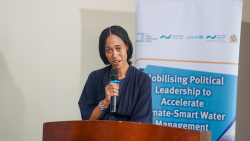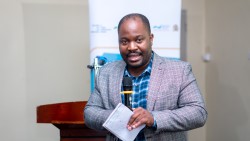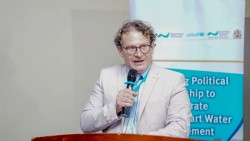GWL coordinators and government representativesfrom the Central African Republic, Malawi, Nepal, Palestine, Rwanda, Tanzania, and Uganda, as well as high-level delegates from UNICEF, the British High Commission in Malawi and GWP met in Lilongwe, Malawi, from 14 to 15 March for a closeout workshop to assess efforts made towards building more climate-resilient water services under the GWL Programme. The 2-day meeting was opened by Malawi’s Deputy Minister of Water and Sanitation, Hon Liana Kakhobwe Chapota, MP (photo at the top of the article).
“I would like to urge all governments that participated in implementing the GWL programme to find a way of integrating these strategies in national plans and policies. That is the easiest way to ensure seamless implementation of the strategies. In Malawi, the three response strategies are expected to feed into the One WASH Programme that Malawi intends to develop and implement,” said Hon. Kakhobwe Chapota during the opening.
Funded by the UK Foreign Commonwealth & Development Office (FCDO), the programme was co-implemented by the Global Water Partnership (GWP), United Nations Children’s Fund (UNICEF), Sanitation and Water for All (SWA), Joint Monitoring Programme for Water Supply, Sanitation and Hygiene (JMP) and the World Health Organization (WHO).
 “For FCDO, water security, sanitation and hygiene are key to our work on global health – with an increasing focus on working with governments to strengthen related systems,” said Ms. Olympia Wereko Brobby, Deputy High Commissioner & Development Director, British High Commission, Malawi who spoke during the opening of the GWL closeout workshop.
“For FCDO, water security, sanitation and hygiene are key to our work on global health – with an increasing focus on working with governments to strengthen related systems,” said Ms. Olympia Wereko Brobby, Deputy High Commissioner & Development Director, British High Commission, Malawi who spoke during the opening of the GWL closeout workshop.
The flagship product of the GWL programme is government-validated Response Strategies for addressing the most critical barriers to climate-resilient water management. Barriers have been identified by national stakeholders, who have prioritised the top two to fourbarriers in their respective countries. Multistakeholder working groups were formed – one per barrier – each tasked with developing a Response Strategy to address their respective barrier.
A sharp contrast from the standard consultant-driven method of writing plans, GWL Response Strategies were the product of local stakeholders.This difference was highlighted and celebrated by the government focal points during the workshop.
 “The ownership [of the Response Strategies] is held by the working groups, not an international consultant,” emphasized Dr. Max Wengawenga, Director of Policy and Planning at the Ministry of Water and Sanitation of Malawi.
“The ownership [of the Response Strategies] is held by the working groups, not an international consultant,” emphasized Dr. Max Wengawenga, Director of Policy and Planning at the Ministry of Water and Sanitation of Malawi.

“It’s OUR strategy” agreed Dr. Kapil Gnawali, Senior Divisional Hydrologist / Engineer at the Water and Energy Commission Secretariat of Nepal.
A Response Strategy contains two components: an Action Plan and a Finance Plan. In addition to the local stakeholder creation of the strategies, the finance plans are what make this programme unique from other development programmes.
 “My favourite feature of the response strategies is that they include comprehensive finance plans, developed by country working groups with assistance from a local finance expert. Without a realistic Finance Plan, the actions that have been outlined will not be undertaken. Building stakeholder capacity in identifying financing options has therefore been a key output of the programme.Strong finance plans enable governments to integrate these strategies more easily into their planning and, most importantly, budgets,” said Ms. Lesley Pories, GWL Global Coordinator at the Global Water Partnership.
“My favourite feature of the response strategies is that they include comprehensive finance plans, developed by country working groups with assistance from a local finance expert. Without a realistic Finance Plan, the actions that have been outlined will not be undertaken. Building stakeholder capacity in identifying financing options has therefore been a key output of the programme.Strong finance plans enable governments to integrate these strategies more easily into their planning and, most importantly, budgets,” said Ms. Lesley Pories, GWL Global Coordinator at the Global Water Partnership.
UNICEF has since urged governments of the seven countries to accelerate implementation of integrated water resources & WASH programming in the wake of increased impacts of climate change.
 “For UNICEF, the Global Water Leadership Programme has been a great opportunity to better integrate water resources management into our Water, Sanitation and Hygiene services. We are committed to sustainable and resilient WASH services; and for the services to be sustainable and resilient, they need sustainable and resilient water resources management,”explained Mr. Gerrit Maritz, Deputy Representative, UNICEF Malawi.
“For UNICEF, the Global Water Leadership Programme has been a great opportunity to better integrate water resources management into our Water, Sanitation and Hygiene services. We are committed to sustainable and resilient WASH services; and for the services to be sustainable and resilient, they need sustainable and resilient water resources management,”explained Mr. Gerrit Maritz, Deputy Representative, UNICEF Malawi.
The GWL Programme launched in April 2021 and winds to a close on 31 March 2024.
Read this GWL country briefs to learn more about implementation of the programme in each of the seven countries.

